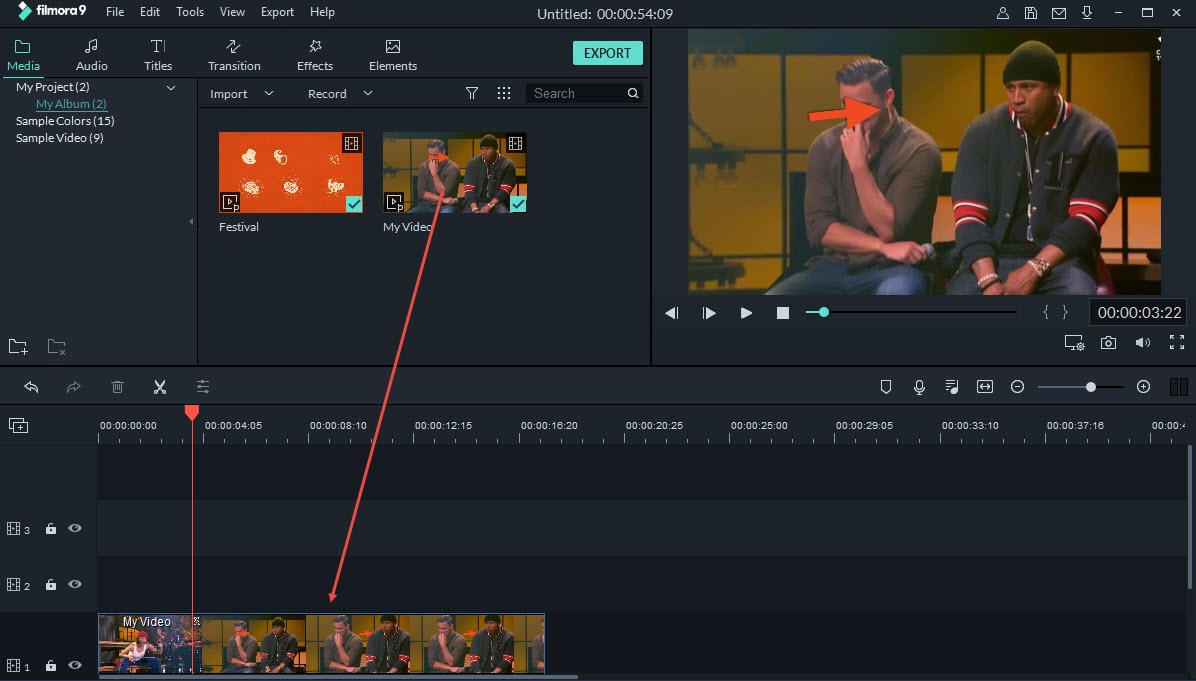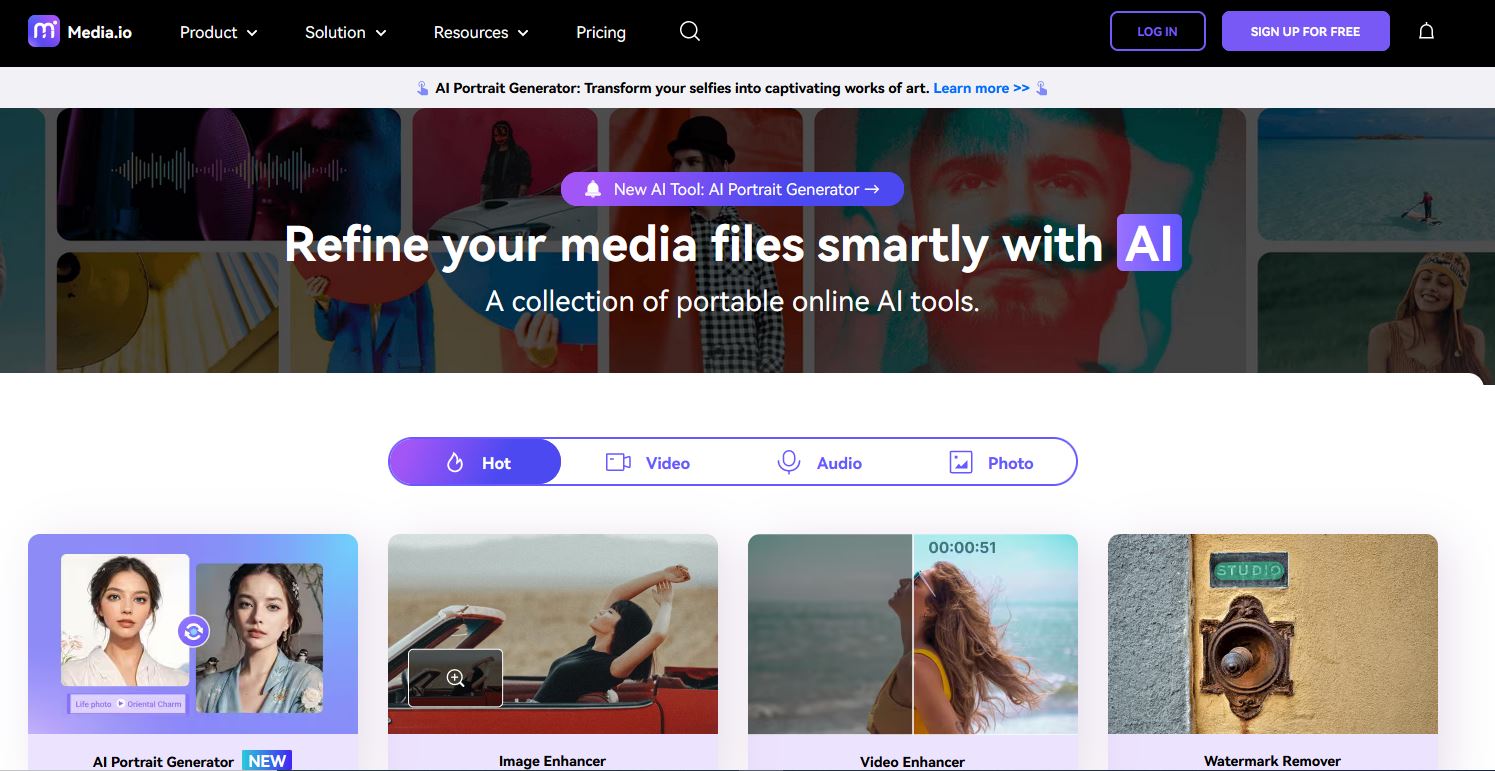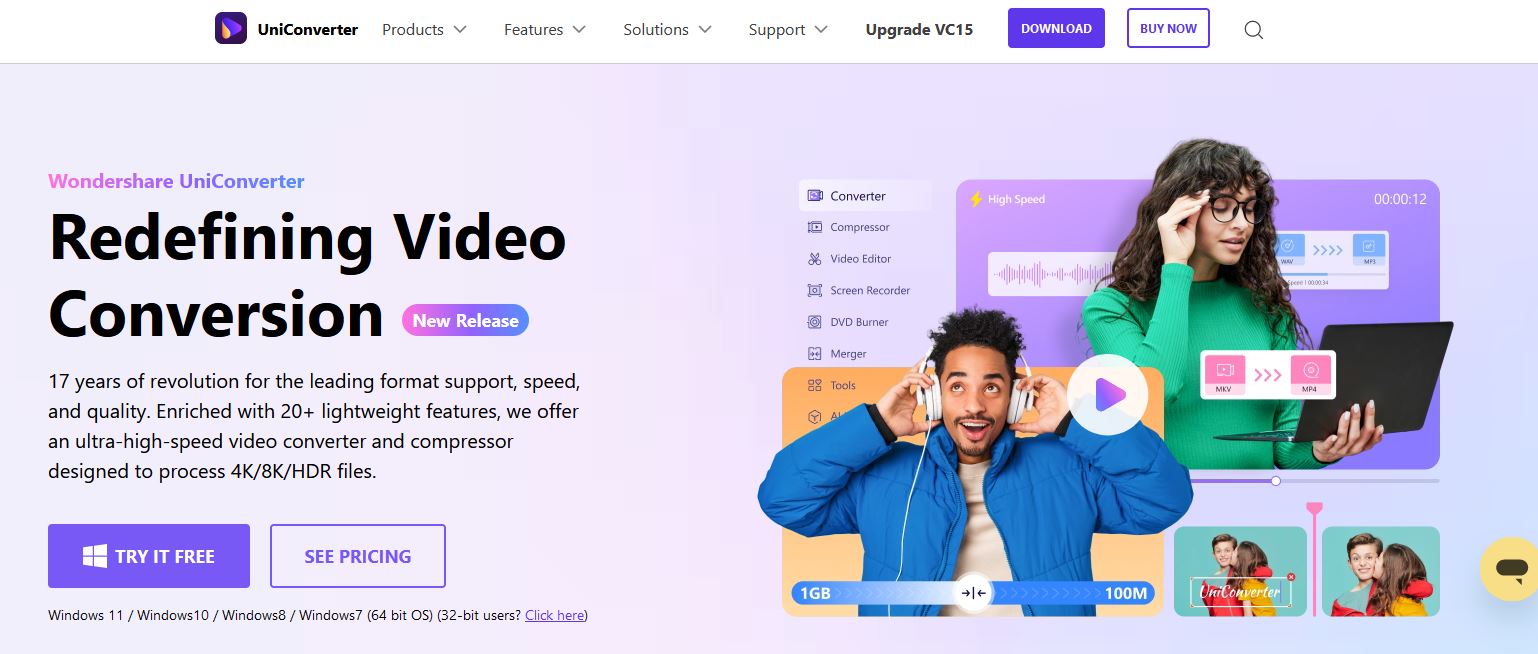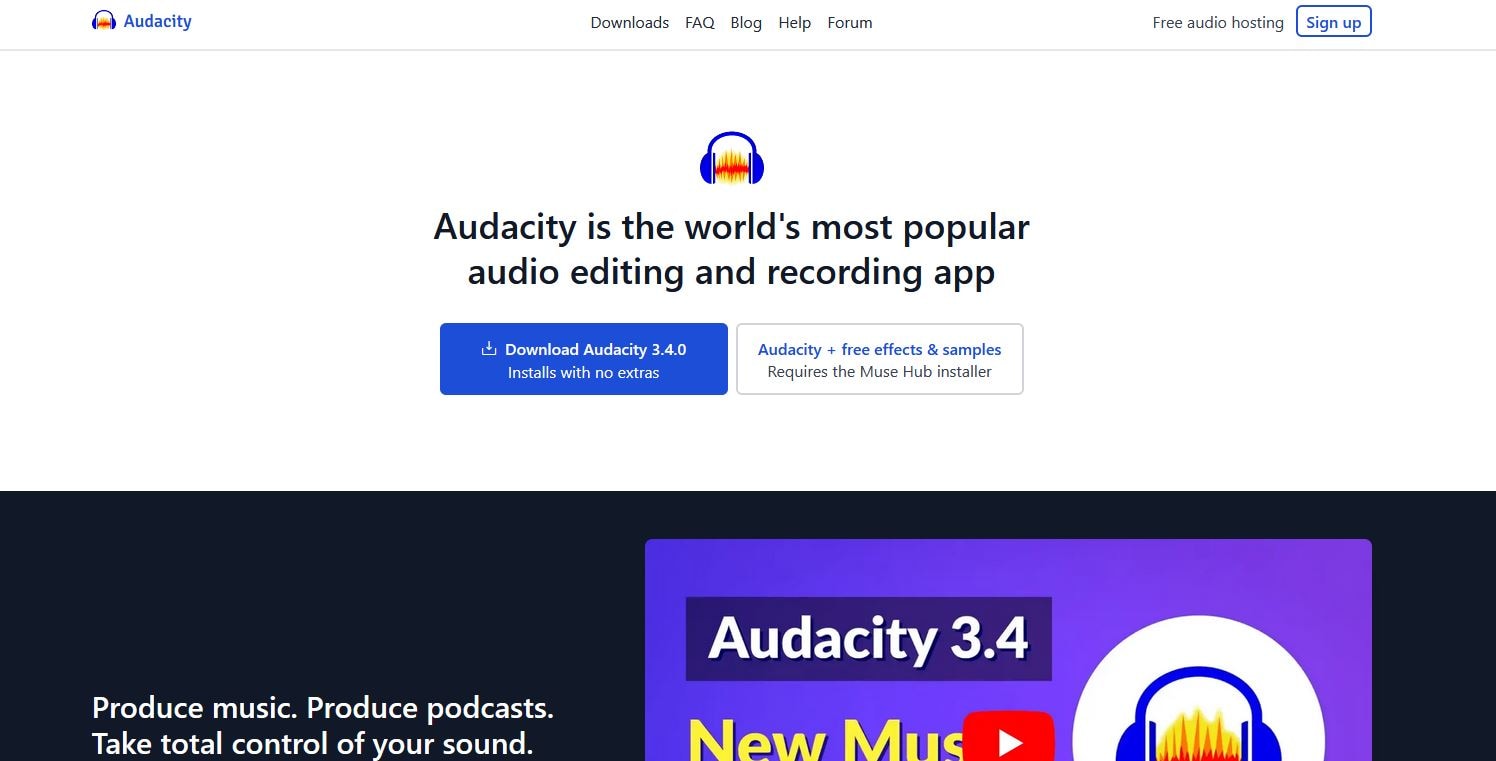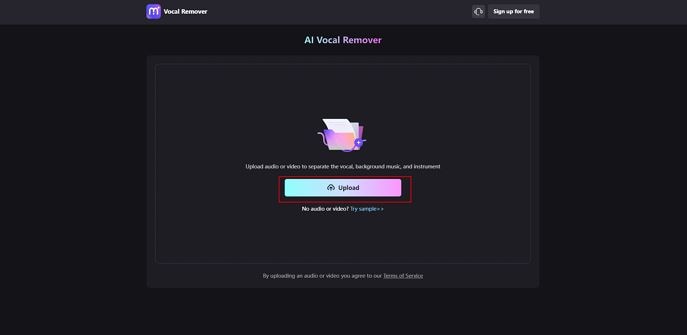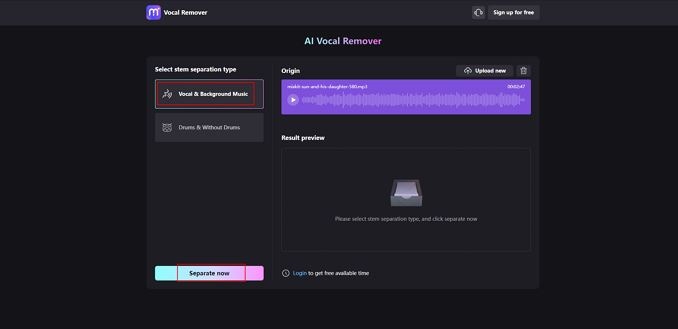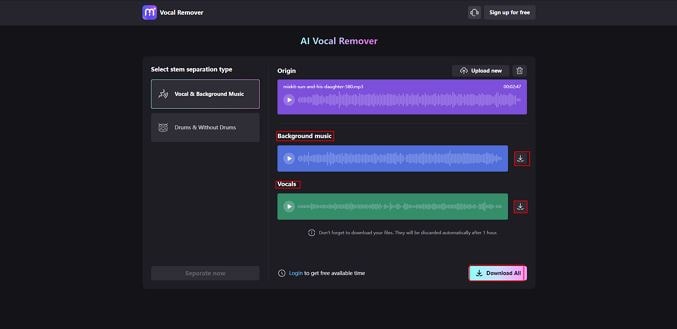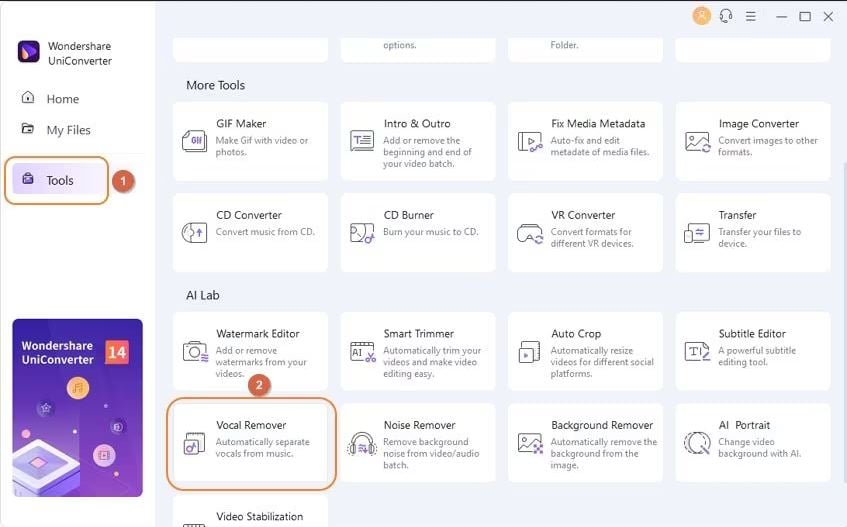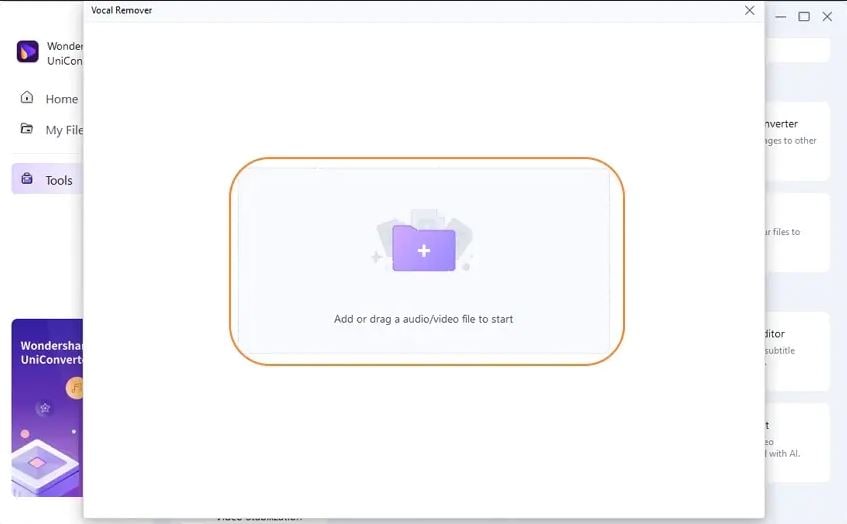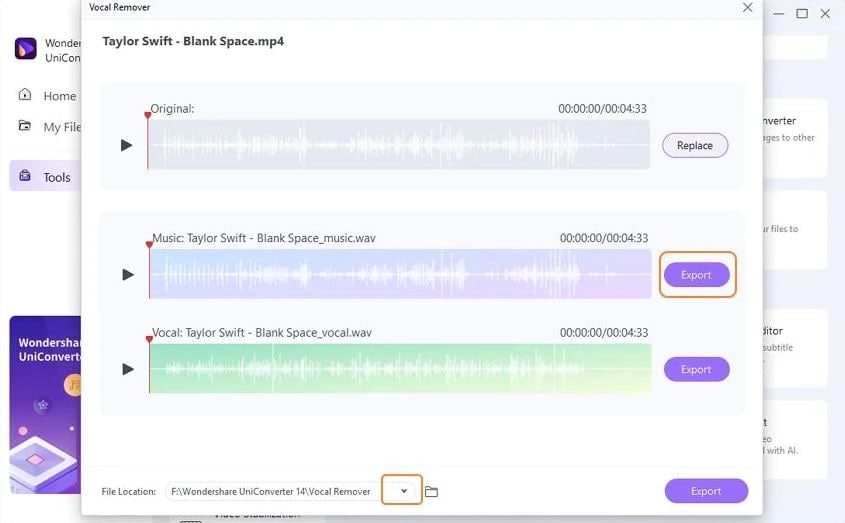
Beyond Dialogue Creative Audio-Video Integration Techniques for Impactful Visual Narratives

Beyond Dialogue: Creative Audio-Video Integration Techniques for Impactful Visual Narratives
The audio or music of video can dramatically affect our perception of a video – no matter whether it’s a home movie, a commercial, or a video presentation. But what if all you have is silent footage or with just a crackled and distorted audio file that needs to be replaced, and at this time, you want to add a sound to the video?
To solve this problem, I humbly recommend Wondershare Filmora . With it, you can easily add audio to video, record the voiceover directly and add it to video, or replace the original audio track (stream) with a new audio file.
In case you want to add music to video with some online tools, please leave a comment below so I can test some online solutions and share with you the best online tools to add audio to video free. I recommend Filmora because its requirement on the network isn’t so high compared to the online tools.
Below is a creative way of adding sound effects to video.
For Win 7 or later (64-bit)
For macOS 10.12 or later
- User-friendly interface enables you to edit your videos easily;
- Supports almost any video and audio formats (including WMV,MOV,FLV,MTS,etc);
- Convenient to add audio to video without quality loss;
- Adding audio to video is so easy
- Supported OS: Windows (Windows 10 included) & Mac OS X (above 10.6).
You May also like 15 Free Music Sites for Commercial Use >>
How to Add Audio to Video Easily
Now see the easy steps to add audio to video files or replace the original audio track with a new voiceover or music.
Step 1: Add audio and video files to the program
After downloading and installing Wondershare Filmora, you can either click Import on the primary windows and select audio and video files from your computer or simply drag and drop audio and video files to the project media library. Filmora also features a free Audio Library, which provides different genres of music and sound effects.
You can preview it and add the proper audio to your video.
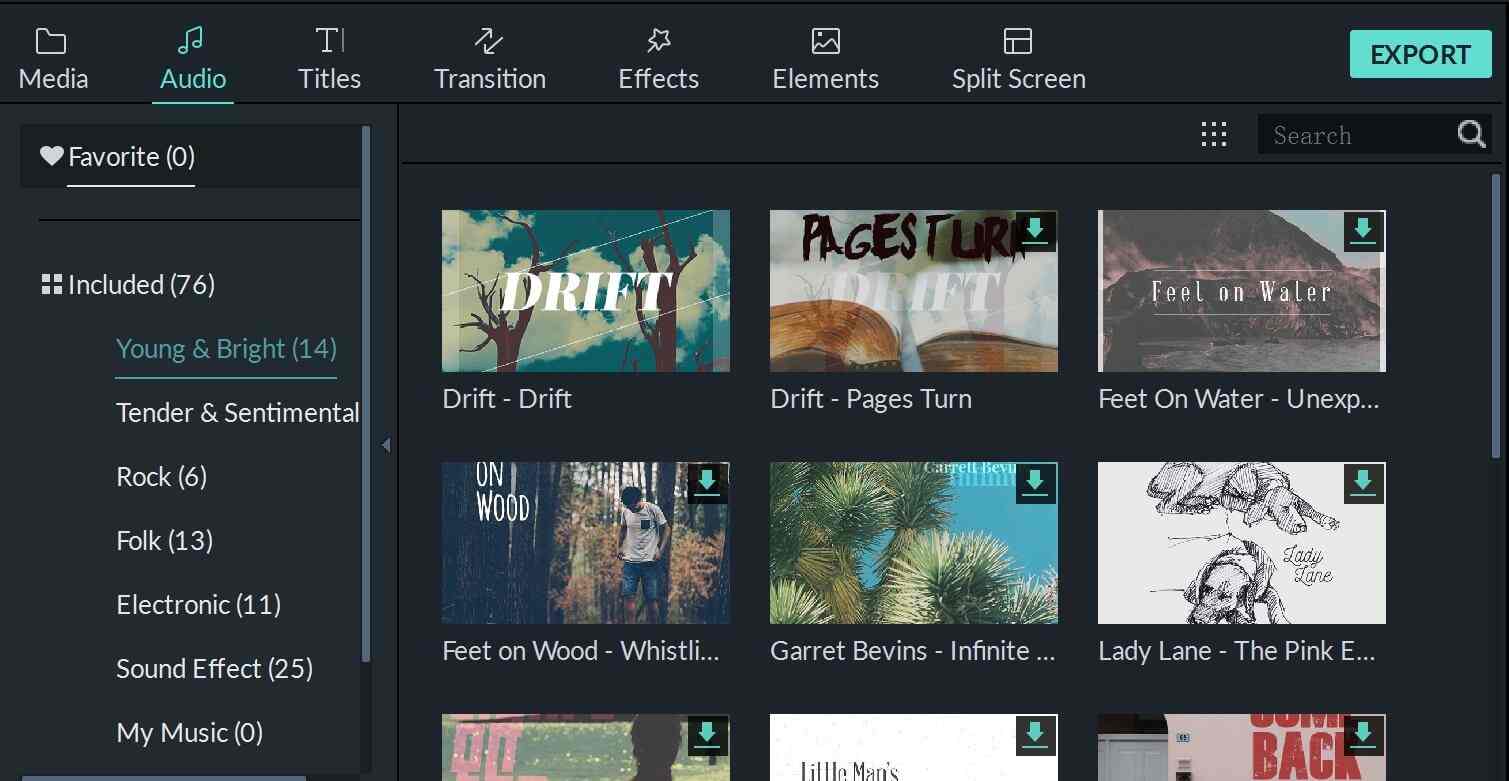
You may also like: 10 Best Free Audio Editor for Windows and Mac
Step 2: Add a new audio file to the video
Drag the audio and video files from the media library or Audio Library and place them on the respective tracks of the timeline, namely, place the audio file to the Audio Track. This way, the audio file(s) will be merged into the video.
Step 3: Record and add your voiceover to video
Instead of adding music to the video , you can also record and add voiceover to the video. It’s a fun way to add narration or complementary audio to video. To do so, click the Record button on the toolbar above timeline, the Record dialog will appear.
Click the red Record button, and you can start to talk in 3 seconds. The voiceover will be added to the User’s Album and timeline when completed.

Step 4: Replace audio track of the video
This is similar to adding audio to video. Just an extra step is required: delete the original audio file. To do so, right-click the video you want to replace audio in it, and select Audio Detach . After that, delete the audio file from the track.
As described above, you can then drag and drop a new audio file from User’s Album to the Audio track.
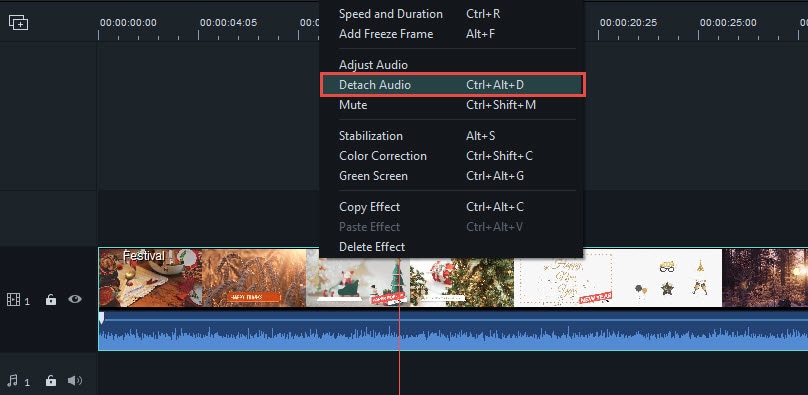
You can click to see more details about How to Replace Audio in Video >>
Step 5: Adjust the audio file and be creative
Various audio editing tools are available: set volume, speed up, slow down, change pitch and add fade in/out effect. Double-click the audio file on the timeline to change the settings and drag the slide bar.
Hit “Return” to confirm the settings and go back to the main interface.
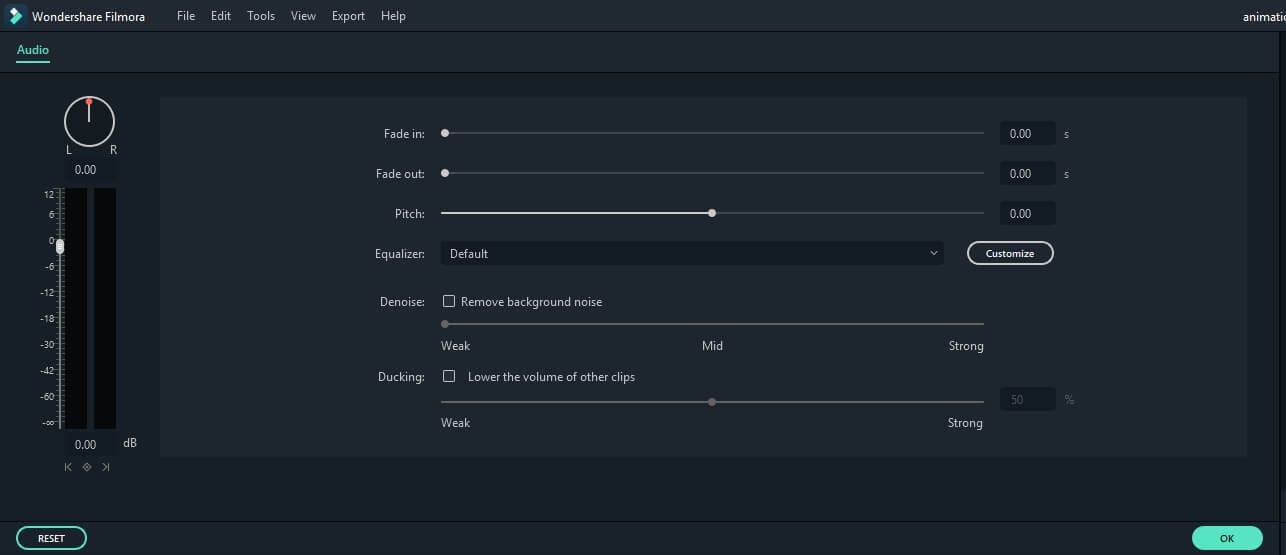
You can also change your voice by adjusting the pitch or speed of the audio file, check the detailed guide about How to change voice with Filmora Voice Changer
Step 6: Export video with new audio track
Click “Create” and select “Format” when all is ready. From the list, choose any format you want as the output format. If necessary, also change the advanced settings. Finally, click the “Create” button to export a new video file to the specified folder on the computer.
Besides export video to your computer, you can also create video for devices like the iPhone, iPad, iPod, directly upload video to YouTube, or burn it to DVD for playing on TV. All in one video editor, no extra software required.
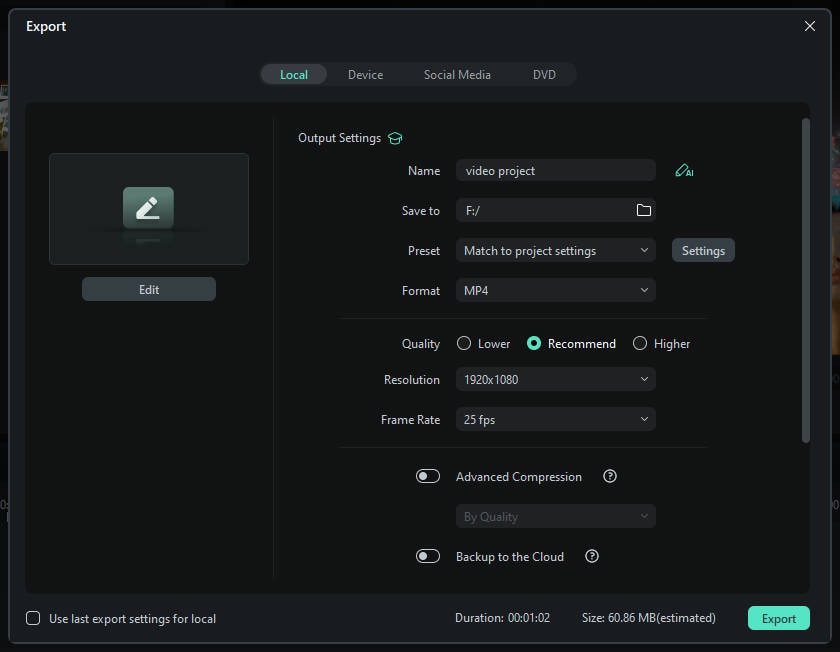
Conclusion
Above are the steps about how to add audio to video with Filmora video editor on Windows and Mac. Typically, you can add your voiceover to the video or detach the original audio and replace it with your voiceover or music file. Whichever you choose, you can adjust the audio settings to get a better result.
For Win 7 or later (64-bit)
For macOS 10.12 or later
For Win 7 or later (64-bit)
For macOS 10.12 or later
- User-friendly interface enables you to edit your videos easily;
- Supports almost any video and audio formats (including WMV,MOV,FLV,MTS,etc);
- Convenient to add audio to video without quality loss;
- Adding audio to video is so easy
- Supported OS: Windows (Windows 10 included) & Mac OS X (above 10.6).
You May also like 15 Free Music Sites for Commercial Use >>
How to Add Audio to Video Easily
Now see the easy steps to add audio to video files or replace the original audio track with a new voiceover or music.
Step 1: Add audio and video files to the program
After downloading and installing Wondershare Filmora, you can either click Import on the primary windows and select audio and video files from your computer or simply drag and drop audio and video files to the project media library. Filmora also features a free Audio Library, which provides different genres of music and sound effects.
You can preview it and add the proper audio to your video.

You may also like: 10 Best Free Audio Editor for Windows and Mac
Step 2: Add a new audio file to the video
Drag the audio and video files from the media library or Audio Library and place them on the respective tracks of the timeline, namely, place the audio file to the Audio Track. This way, the audio file(s) will be merged into the video.
Step 3: Record and add your voiceover to video
Instead of adding music to the video , you can also record and add voiceover to the video. It’s a fun way to add narration or complementary audio to video. To do so, click the Record button on the toolbar above timeline, the Record dialog will appear.
Click the red Record button, and you can start to talk in 3 seconds. The voiceover will be added to the User’s Album and timeline when completed.

Step 4: Replace audio track of the video
This is similar to adding audio to video. Just an extra step is required: delete the original audio file. To do so, right-click the video you want to replace audio in it, and select Audio Detach . After that, delete the audio file from the track.
As described above, you can then drag and drop a new audio file from User’s Album to the Audio track.

You can click to see more details about How to Replace Audio in Video >>
Step 5: Adjust the audio file and be creative
Various audio editing tools are available: set volume, speed up, slow down, change pitch and add fade in/out effect. Double-click the audio file on the timeline to change the settings and drag the slide bar.
Hit “Return” to confirm the settings and go back to the main interface.

You can also change your voice by adjusting the pitch or speed of the audio file, check the detailed guide about How to change voice with Filmora Voice Changer
Step 6: Export video with new audio track
Click “Create” and select “Format” when all is ready. From the list, choose any format you want as the output format. If necessary, also change the advanced settings. Finally, click the “Create” button to export a new video file to the specified folder on the computer.
Besides export video to your computer, you can also create video for devices like the iPhone, iPad, iPod, directly upload video to YouTube, or burn it to DVD for playing on TV. All in one video editor, no extra software required.

Conclusion
Above are the steps about how to add audio to video with Filmora video editor on Windows and Mac. Typically, you can add your voiceover to the video or detach the original audio and replace it with your voiceover or music file. Whichever you choose, you can adjust the audio settings to get a better result.
For Win 7 or later (64-bit)
For macOS 10.12 or later
For Win 7 or later (64-bit)
For macOS 10.12 or later
- User-friendly interface enables you to edit your videos easily;
- Supports almost any video and audio formats (including WMV,MOV,FLV,MTS,etc);
- Convenient to add audio to video without quality loss;
- Adding audio to video is so easy
- Supported OS: Windows (Windows 10 included) & Mac OS X (above 10.6).
You May also like 15 Free Music Sites for Commercial Use >>
How to Add Audio to Video Easily
Now see the easy steps to add audio to video files or replace the original audio track with a new voiceover or music.
Step 1: Add audio and video files to the program
After downloading and installing Wondershare Filmora, you can either click Import on the primary windows and select audio and video files from your computer or simply drag and drop audio and video files to the project media library. Filmora also features a free Audio Library, which provides different genres of music and sound effects.
You can preview it and add the proper audio to your video.

You may also like: 10 Best Free Audio Editor for Windows and Mac
Step 2: Add a new audio file to the video
Drag the audio and video files from the media library or Audio Library and place them on the respective tracks of the timeline, namely, place the audio file to the Audio Track. This way, the audio file(s) will be merged into the video.
Step 3: Record and add your voiceover to video
Instead of adding music to the video , you can also record and add voiceover to the video. It’s a fun way to add narration or complementary audio to video. To do so, click the Record button on the toolbar above timeline, the Record dialog will appear.
Click the red Record button, and you can start to talk in 3 seconds. The voiceover will be added to the User’s Album and timeline when completed.

Step 4: Replace audio track of the video
This is similar to adding audio to video. Just an extra step is required: delete the original audio file. To do so, right-click the video you want to replace audio in it, and select Audio Detach . After that, delete the audio file from the track.
As described above, you can then drag and drop a new audio file from User’s Album to the Audio track.

You can click to see more details about How to Replace Audio in Video >>
Step 5: Adjust the audio file and be creative
Various audio editing tools are available: set volume, speed up, slow down, change pitch and add fade in/out effect. Double-click the audio file on the timeline to change the settings and drag the slide bar.
Hit “Return” to confirm the settings and go back to the main interface.

You can also change your voice by adjusting the pitch or speed of the audio file, check the detailed guide about How to change voice with Filmora Voice Changer
Step 6: Export video with new audio track
Click “Create” and select “Format” when all is ready. From the list, choose any format you want as the output format. If necessary, also change the advanced settings. Finally, click the “Create” button to export a new video file to the specified folder on the computer.
Besides export video to your computer, you can also create video for devices like the iPhone, iPad, iPod, directly upload video to YouTube, or burn it to DVD for playing on TV. All in one video editor, no extra software required.

Conclusion
Above are the steps about how to add audio to video with Filmora video editor on Windows and Mac. Typically, you can add your voiceover to the video or detach the original audio and replace it with your voiceover or music file. Whichever you choose, you can adjust the audio settings to get a better result.
For Win 7 or later (64-bit)
For macOS 10.12 or later
For Win 7 or later (64-bit)
For macOS 10.12 or later
- User-friendly interface enables you to edit your videos easily;
- Supports almost any video and audio formats (including WMV,MOV,FLV,MTS,etc);
- Convenient to add audio to video without quality loss;
- Adding audio to video is so easy
- Supported OS: Windows (Windows 10 included) & Mac OS X (above 10.6).
You May also like 15 Free Music Sites for Commercial Use >>
How to Add Audio to Video Easily
Now see the easy steps to add audio to video files or replace the original audio track with a new voiceover or music.
Step 1: Add audio and video files to the program
After downloading and installing Wondershare Filmora, you can either click Import on the primary windows and select audio and video files from your computer or simply drag and drop audio and video files to the project media library. Filmora also features a free Audio Library, which provides different genres of music and sound effects.
You can preview it and add the proper audio to your video.

You may also like: 10 Best Free Audio Editor for Windows and Mac
Step 2: Add a new audio file to the video
Drag the audio and video files from the media library or Audio Library and place them on the respective tracks of the timeline, namely, place the audio file to the Audio Track. This way, the audio file(s) will be merged into the video.
Step 3: Record and add your voiceover to video
Instead of adding music to the video , you can also record and add voiceover to the video. It’s a fun way to add narration or complementary audio to video. To do so, click the Record button on the toolbar above timeline, the Record dialog will appear.
Click the red Record button, and you can start to talk in 3 seconds. The voiceover will be added to the User’s Album and timeline when completed.

Step 4: Replace audio track of the video
This is similar to adding audio to video. Just an extra step is required: delete the original audio file. To do so, right-click the video you want to replace audio in it, and select Audio Detach . After that, delete the audio file from the track.
As described above, you can then drag and drop a new audio file from User’s Album to the Audio track.

You can click to see more details about How to Replace Audio in Video >>
Step 5: Adjust the audio file and be creative
Various audio editing tools are available: set volume, speed up, slow down, change pitch and add fade in/out effect. Double-click the audio file on the timeline to change the settings and drag the slide bar.
Hit “Return” to confirm the settings and go back to the main interface.

You can also change your voice by adjusting the pitch or speed of the audio file, check the detailed guide about How to change voice with Filmora Voice Changer
Step 6: Export video with new audio track
Click “Create” and select “Format” when all is ready. From the list, choose any format you want as the output format. If necessary, also change the advanced settings. Finally, click the “Create” button to export a new video file to the specified folder on the computer.
Besides export video to your computer, you can also create video for devices like the iPhone, iPad, iPod, directly upload video to YouTube, or burn it to DVD for playing on TV. All in one video editor, no extra software required.

Conclusion
Above are the steps about how to add audio to video with Filmora video editor on Windows and Mac. Typically, you can add your voiceover to the video or detach the original audio and replace it with your voiceover or music file. Whichever you choose, you can adjust the audio settings to get a better result.
For Win 7 or later (64-bit)
For macOS 10.12 or later
From Full Song to Solo Groove: Navigating Tools for Beats Extraction
You may want to extra beat from song for your YouTube videos or other creative projects. Or maybe you just want to create an instrumentals file perfect for singing karaoke. Using the original song may not give the thrill you are after due to the effects and other noises. With a beat remover from song, you will have more ways to enjoy the music. In this article, we explore ways to extract beat from song online and include software to make this super easy.
AI Vocal Remover A cross-platform for facilitating your video editing process by offering valuable benefits!
Free Download Free Download Learn More
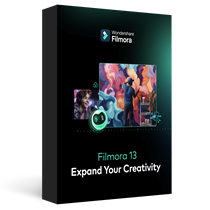
Part 1. Best Tools to Extract Beats from Songs Like a Pro: The Ultimate Guide
Choosing a beat remover from song tool can be easier when you know the options available. Some of the tools allow you to remove the beat online while others work perfectly online. Let’s explore the top five tools, including the pros and cons for each:
1. Media.io
Media.io is a reliable beat remover from a song. The online tool is commonly used as an MP3 voice remover but also has a range of other effective features. It is AI-powered, which helps to provide quality output in a timely manner. Quickly get your instrumental songs for free with no software or app required.
Pros
- Easy-to-use software that removes beats from songs accurately
- Automatically extracts beats from standard video and audio formats
- Offers additional audio editing tools like compressing and trimming
- Convenient to share with smart output settings
Cons
- File upload is limited to 100MB only
2. UniConverter
UniConnverter is an effective video converter and compressor that works well in removing beats from a song. Enriched with over 20 lightweight features, the software effectively edits 4K, 8K, and HDR files. The software has many uses, including instrumental extractors for practicing karaoke performance or even embedding beats in the background of your TikTok video.
Pros
- Ultra-fast removal of beats and processing of audio
- Effectively separates vocals and beats in song and other audio files
- A video-to-audio conversion tool
Cons
- A bit costly
3. Audacity
This is one of the best and easiest ways to remove beat from song online. It is a popular choice for beginners and professionals because all features are on the same platform. Being a free and open-source program, Audacity is a great choice for editing audio professionally. It comes with all audio editing features, including instrumental or beat extractor. Simply use the remove vocal options on the program to achieve quality audio output.
Pros
- Free, open-source beat and instrumental extractor
- Supports a wide range of audio formats
- No file size limit required
Cons
- Doesn’t support video formats
- Not beginner-friendly
4. PhonicMind
This is a quick and simple online tool for extracting beats from a song online. It supports all the standard audio formats and prepares download MP3 files. PhonicMind also allows you to download the beats file in MP4, ZIP, and FLAC using the Pro Plan. As an online instrumental extractor, PhonicMind also works well with stem extraction that supports vocals, piano, bass, drums, and many more with intuitive features for Android and iPhones.
Pros
- Supports stem extraction
- Multiple audio input formats
- Simple to use and process beats
Cons
- Free users can only export the output in MP3
- 100MB file limit
5. Lalal.ai
This is a simple and free program for extracting beats from a song. The ad-free online program allows you to extract beats and vocals within minutes while keeping the same high quality. It also supports stem extraction that allows users to extract vocals, beats, bass, piano, synthesizer, and guitar. The free plan supports beat extraction for up to 10 minutes. When you upgrade to the paid plan, you now get up to 300 minutes.
Pros
- Supports step extraction, allowing you to extract various audio components
- Simple and fast instrumental extractor
- Pocket-friendly plans
Cons
- No audio editing function
- Limited free plan
Part 2. How to Extract Beat From Song Tutorial: Two Ways
While each of the tools is effective in removing beats from your favorite songs, media.io and UniConverter stand out as having some of the best features. They are easy to use and provide accurate results within a short time.
How to Extract Beat from Song Tutorial
- 1. How to Extract Beats from Songs Using Media.io
- 2. How to Extract Beats from Songs Using UniConverter
1. How to Extract Beats from Songs Using Media.io
Media.io is a great tool for removing beats from songs. It produces high-quality musical vocals and instrumentals while preserving the integrity of the original tracks. Here are the steps to follow:
Step 1Visit Media.io
Got to the Media.io official website. Then upload the audio file you want to process.
Step 2Start Vocal and Background Music Feature
On the left side of the site, select “Vocal & Background Music.” Then click “Separate Now” to start extracting the best from your audio file.
Step 3Download Processed Files
After the processing is complete, the audio will be separated into vocals and background music or the beats. Finally, click the download button.
2. How to Extract Beats from Songs Using UniConverter
With UniConverter, extracting beats from songs is quick and easy on your PC. The program uses advanced AI to quickly scan files and separate vocals and beats from a song without losing the quality. Here are the steps to follow:
Step 1Launch UniConverter
Install and run the UniConverter software on your PC. Tap tools on the left menu bar and click on the “Vocal Remover” from the “AI Lab” section.
Step 2Upload Your Files
Drag and drop your audio file or sound soundtrack on the UniConverter workspace. Then click “Add Files” to browse and upload the files you want to process. The AI instrumental remover automatically scans your file to separate the vocals and beats from the song.
Step 3Export the Processed Files
Once the files have been processed, preview the vocals and beats to see if it is what you really want. Tap “Export” to save the processed files to your selected file location. The entire process takes only a few minutes.
Part 3. Extract Beats from Songs with Wondershare Filmora
Extracting beats from songs becomes easier with more advanced software. Wondershare Filmora is one such software that comes with unique features for editing audio and videos. The recently released version 13 is particularly useful for automating most of the editing tasks. Powered by AI, Filmora’s features make it easy to edit audio and video while keeping the high quality. Let’s explore the audio editing feature that will help you extract beats and further edit your audio.
Free Download For Win 7 or later(64-bit)
Free Download For macOS 10.14 or later
1. AI Vocal Remover
Removing beats from your songs is made easier with the AI Vocal Remover feature. The feature automatically separates vocals and instrumentals from any songs. This means you can enjoy listening to the beats of your favorite songs without the vocals. The feature also helps in extracting acapella from music tracks, and dub videos freely within minutes. The best of it all, you get to keep the same high-quality beats from the songs.
2. AI Music Generator
In addition to extracting beats from songs and removing acapella, Filmora also allows you to generate music for your videos. The AI Music Generator feature will generate a musical masterpiece for you in seconds. You get to choose between different genres and styles. This AI feature also allows you to seamlessly edit your music creation on the go. Your videos become livelier and engaging to the viewers.
3. AI Copilot Editing
Another useful feature on Filmora is AI Copilot Editing, which makes it easy for you to edit your audio and video. You only need to ask Filmora to perform a certain editing task, and it will do the rest of the work for you. This streamlines your editing process by offering real-time guidance and prevents common errors by detecting conflicting messages. The Copilot also optimizes your workflow by providing valuable AI insights and support on every step of video editing.
Conclusion
When you want to extract beat from song, choosing good software will make the entire process easier. The methods shared here demonstrate how different tools can be used to separate vocals and beats in an audio file. Each uses a different approach and provides a certain quality level of output. However, we recommend Wondershare Filmora because of its phenomenal audio and editing features. In addition to extracting beats from your favorite songs, the software allows you to edit the files further for other purposes.
Free Download Free Download Learn More

Part 1. Best Tools to Extract Beats from Songs Like a Pro: The Ultimate Guide
Choosing a beat remover from song tool can be easier when you know the options available. Some of the tools allow you to remove the beat online while others work perfectly online. Let’s explore the top five tools, including the pros and cons for each:
1. Media.io
Media.io is a reliable beat remover from a song. The online tool is commonly used as an MP3 voice remover but also has a range of other effective features. It is AI-powered, which helps to provide quality output in a timely manner. Quickly get your instrumental songs for free with no software or app required.
Pros
- Easy-to-use software that removes beats from songs accurately
- Automatically extracts beats from standard video and audio formats
- Offers additional audio editing tools like compressing and trimming
- Convenient to share with smart output settings
Cons
- File upload is limited to 100MB only
2. UniConverter
UniConnverter is an effective video converter and compressor that works well in removing beats from a song. Enriched with over 20 lightweight features, the software effectively edits 4K, 8K, and HDR files. The software has many uses, including instrumental extractors for practicing karaoke performance or even embedding beats in the background of your TikTok video.
Pros
- Ultra-fast removal of beats and processing of audio
- Effectively separates vocals and beats in song and other audio files
- A video-to-audio conversion tool
Cons
- A bit costly
3. Audacity
This is one of the best and easiest ways to remove beat from song online. It is a popular choice for beginners and professionals because all features are on the same platform. Being a free and open-source program, Audacity is a great choice for editing audio professionally. It comes with all audio editing features, including instrumental or beat extractor. Simply use the remove vocal options on the program to achieve quality audio output.
Pros
- Free, open-source beat and instrumental extractor
- Supports a wide range of audio formats
- No file size limit required
Cons
- Doesn’t support video formats
- Not beginner-friendly
4. PhonicMind
This is a quick and simple online tool for extracting beats from a song online. It supports all the standard audio formats and prepares download MP3 files. PhonicMind also allows you to download the beats file in MP4, ZIP, and FLAC using the Pro Plan. As an online instrumental extractor, PhonicMind also works well with stem extraction that supports vocals, piano, bass, drums, and many more with intuitive features for Android and iPhones.
Pros
- Supports stem extraction
- Multiple audio input formats
- Simple to use and process beats
Cons
- Free users can only export the output in MP3
- 100MB file limit
5. Lalal.ai
This is a simple and free program for extracting beats from a song. The ad-free online program allows you to extract beats and vocals within minutes while keeping the same high quality. It also supports stem extraction that allows users to extract vocals, beats, bass, piano, synthesizer, and guitar. The free plan supports beat extraction for up to 10 minutes. When you upgrade to the paid plan, you now get up to 300 minutes.
Pros
- Supports step extraction, allowing you to extract various audio components
- Simple and fast instrumental extractor
- Pocket-friendly plans
Cons
- No audio editing function
- Limited free plan
Part 2. How to Extract Beat From Song Tutorial: Two Ways
While each of the tools is effective in removing beats from your favorite songs, media.io and UniConverter stand out as having some of the best features. They are easy to use and provide accurate results within a short time.
How to Extract Beat from Song Tutorial
- 1. How to Extract Beats from Songs Using Media.io
- 2. How to Extract Beats from Songs Using UniConverter
1. How to Extract Beats from Songs Using Media.io
Media.io is a great tool for removing beats from songs. It produces high-quality musical vocals and instrumentals while preserving the integrity of the original tracks. Here are the steps to follow:
Step 1Visit Media.io
Got to the Media.io official website. Then upload the audio file you want to process.
Step 2Start Vocal and Background Music Feature
On the left side of the site, select “Vocal & Background Music.” Then click “Separate Now” to start extracting the best from your audio file.
Step 3Download Processed Files
After the processing is complete, the audio will be separated into vocals and background music or the beats. Finally, click the download button.
2. How to Extract Beats from Songs Using UniConverter
With UniConverter, extracting beats from songs is quick and easy on your PC. The program uses advanced AI to quickly scan files and separate vocals and beats from a song without losing the quality. Here are the steps to follow:
Step 1Launch UniConverter
Install and run the UniConverter software on your PC. Tap tools on the left menu bar and click on the “Vocal Remover” from the “AI Lab” section.
Step 2Upload Your Files
Drag and drop your audio file or sound soundtrack on the UniConverter workspace. Then click “Add Files” to browse and upload the files you want to process. The AI instrumental remover automatically scans your file to separate the vocals and beats from the song.
Step 3Export the Processed Files
Once the files have been processed, preview the vocals and beats to see if it is what you really want. Tap “Export” to save the processed files to your selected file location. The entire process takes only a few minutes.
Part 3. Extract Beats from Songs with Wondershare Filmora
Extracting beats from songs becomes easier with more advanced software. Wondershare Filmora is one such software that comes with unique features for editing audio and videos. The recently released version 13 is particularly useful for automating most of the editing tasks. Powered by AI, Filmora’s features make it easy to edit audio and video while keeping the high quality. Let’s explore the audio editing feature that will help you extract beats and further edit your audio.
Free Download For Win 7 or later(64-bit)
Free Download For macOS 10.14 or later
1. AI Vocal Remover
Removing beats from your songs is made easier with the AI Vocal Remover feature. The feature automatically separates vocals and instrumentals from any songs. This means you can enjoy listening to the beats of your favorite songs without the vocals. The feature also helps in extracting acapella from music tracks, and dub videos freely within minutes. The best of it all, you get to keep the same high-quality beats from the songs.
2. AI Music Generator
In addition to extracting beats from songs and removing acapella, Filmora also allows you to generate music for your videos. The AI Music Generator feature will generate a musical masterpiece for you in seconds. You get to choose between different genres and styles. This AI feature also allows you to seamlessly edit your music creation on the go. Your videos become livelier and engaging to the viewers.
3. AI Copilot Editing
Another useful feature on Filmora is AI Copilot Editing, which makes it easy for you to edit your audio and video. You only need to ask Filmora to perform a certain editing task, and it will do the rest of the work for you. This streamlines your editing process by offering real-time guidance and prevents common errors by detecting conflicting messages. The Copilot also optimizes your workflow by providing valuable AI insights and support on every step of video editing.
Conclusion
When you want to extract beat from song, choosing good software will make the entire process easier. The methods shared here demonstrate how different tools can be used to separate vocals and beats in an audio file. Each uses a different approach and provides a certain quality level of output. However, we recommend Wondershare Filmora because of its phenomenal audio and editing features. In addition to extracting beats from your favorite songs, the software allows you to edit the files further for other purposes.
Systematic Review of Sound Forge’s Audio Enhancement Techniques
In the music industry, the audio content version has changed drastically. As a result, music production and marketing are growing faster than ever, and only those with proper, updated tools and skills are capable of surviving in this era.
Audio editing tools are in demand for different purposes, such as adding effects to audio and removing pauses from a webinar session. Choosing an audio editor depends on many factors, such as price range, the purpose of using an editor, and skill level. The best editing program can help you get the best audio finishing - MAGIX Sound Forge.
If you are new to the music industry or a professional searching for an audio editor, this article will help you learn everything about Sound Forge.
Part 1. A Quick Verdict of Sound Forge
Sound Forge is one of the best software for professionals, beginners, and enthusiasts due to its simple and essential restoration tools that can help remove unnecessary background noises. However, this music software can remove 70% of the noise, leaving some cracks and pops, but still, users get a lot of improvement in the audio quality.
You can record and extract audio from video files. The customizable toolbars, interfaces, and a wide variety of presets give you a complete audio editing experience with Sound Forge.
The only drawback is that the software cannot handle multiple audio files and plugin effects together in the free version, making it useless for batch processing. However, you can get these features in the paid version.
Part 2. What is Sound Forge?
Sound Forge is an audio editor for newbies and professionals and has two versions, i.e., Sound Forge pro 12 and Sound Forge Audio Studio 13, released in April 2018 and January 2019, respectively. Although the software was developed in the US, MAGIX is doing further developments, so you get American originality and German modifications in one program.
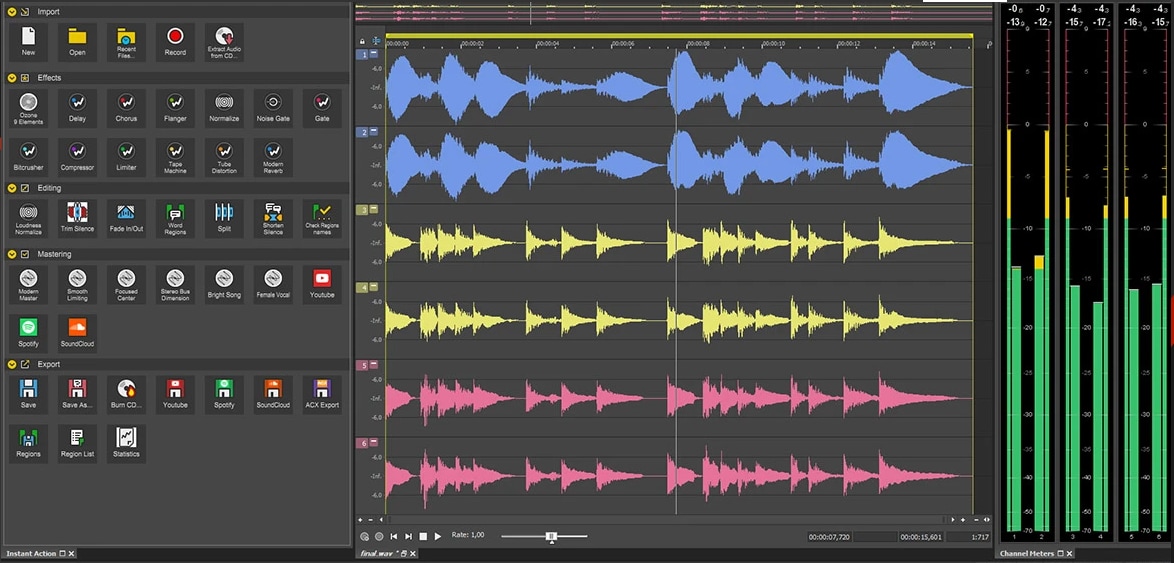
The innovative features such as fast and powerful processing, editing, and workflow are why many producers, including Grammy winners, have chosen this tool globally for the past 20 years.
MAGIX has developed the latest version of this software, Sound Forge Pro 16 suite , setting new audio quality standards with advanced plug-ins.
Part 3. MAGIX Sound Forge 16 Review
Now that you know about Sound Forge and its origin, let’s review the software regarding price, features, and user ratings.
How much does Sound Forge cost?
Sound Forge is a paid software but excellent value for money and offers a wide range of features and plug-ins that make audio editing fun and easy.
The different versions are available at different pricing, and monthly or yearly subscriptions are also available.
Sound Forge Audio Studio 365 is available at 3-5$ per month per year with a starting price of 60$. Sound Forge Pro is available for 279$, Sound Forge Pro Suite for 399$, Sound Forge Pro 365 for 14.99$ per month, and Sound Forge Pro Suite 365 for 19.99$ per month.
Innovative features of Sound Forge
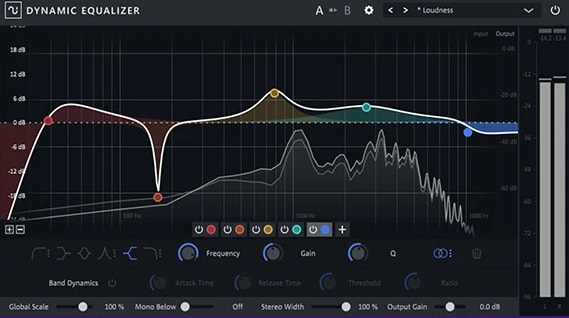
Here are some unique Sound Forge features that make it ideal for audio editing needs.
- Professional and Comprehensive audio editing: The improved workflow of the software allows you to edit, splice, and adjust audio files with just a few clicks and deliver a professional audio finish as precisely as you want.
- Audio restoration: Sound Forge restores vinyl and tapes into digital audio such as CDs, transforming outdated sound into exceptional studio quality. However, you need to have a vinyl converter turntable for this purpose.The Audio Studio version lacks the audio restoration plugins that the Pro Studio version offer.
- Recording any sound up to 32-bit/384 kHz: With Sound Forge, you can record podcasts, singing, webinars, and do a voice-over up to 32-bit/384 kHz and view the process with a live waveform display and real-time monitoring.
- Effects and effects presets: Sound Forge provide 11 DirectX audio effects and 90 effects preset to get the right sound for you. Furthermore, the software can let you preview the effects before applying them to your audio recordings.
- Import and export audio file: You can import or export any audio file into standard (MP3, FLAC, WAV, RAW, ASF, CDA, AIFF, VOX, OGG, MUS, and W64) formats with Sound Forge Audio Studio 16.
Score on G2
The overall G2 (a famous software review website) rating of Sound Forge is 4.3 out of 5. Users rated the software on the G2 platform as:
- 4 for “Ease of use
- 4 for “Quality Support
- 9 for “Ease of Setup
To help you have a better overview of MAGIX Sound Forge 16, we have prepared a review video below.
Video - New Features and Workflows of MAGIX Sound Forge 16
Part 4. Pros and Cons of MAGIX Sound Forge
Below are some Sound Forge pros and cons to help you make a quick decision about the software.
Pros of Sound Forge
- User-friendly: The top-notch software comes with a user-friendly interface, making it easy to learn and simple to control for beginners in the audio editing field.
- Compatibility: The high-quality audio software solution is available for both Windows and Mac operating systems.
- Customizable software: Sound Forge is the most customizable software, offering customization of toolbars to get the exact tools you need and letting you change audio editing windows arrangement.
- Support VST plugin: Sound Forge supports the VST plugin that is used to integrate software audio effects and effect plugins to help you create a more compelling final product.
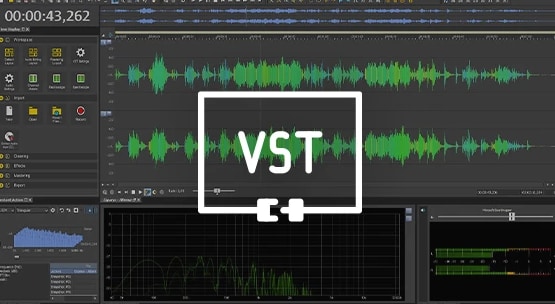
Cons of Sound Forge
- No Batch Processing: one main drawback of Sound Forge is that it cannot do batch processing, making it useless to process multiple audio files and plug-ins together.
- Noise reduction/ Noise cancellation: The software does not do much for noise reduction; its “Noise Gate Technology” distort the recording instead of filtering the noise.
Part 5. MAGIX Sound Forge vs. Audacity
Both Sound Forge and Audacity are audio editing and mixing software. By comparing their features, you can get an idea to which one to use for your audio editing projects.
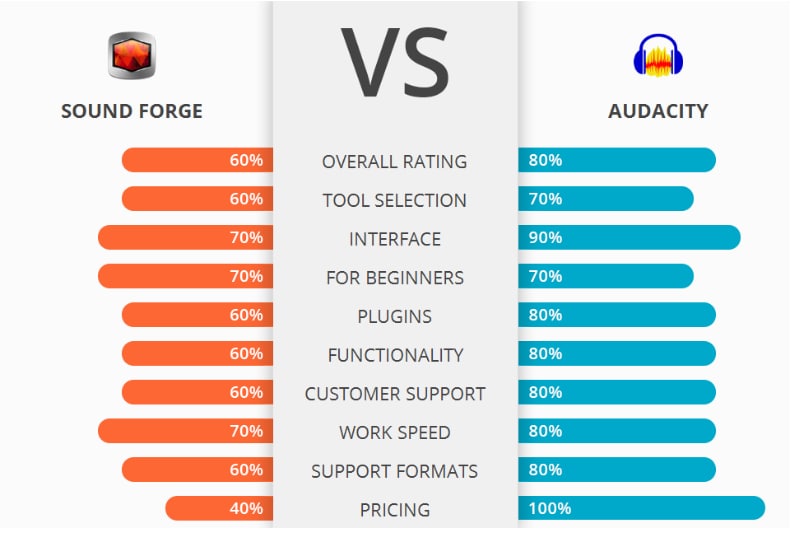
What is Audacity?
Audacity is free and open-source software developed by Dominic Mazzoni and Roger Dannenberg and released on May 28, 2000. In April 2021, Muse group acquired the Audacity trademark but kept the application free and open source.
Audacity offers a great variety of features, such as a playback/record tool, editing options, and a wide range of effects that help professionals to adjust soundtracks, import and export audio files in any standard format, and analyze sound frequencies.
Comparing Sound Forge and Audacity
| Features | Sound Forge | Audacity |
|---|---|---|
| Price/ Value for money | 4.7/5 | 4.5/5 |
| Compatibility | Windows and Mac | Windows and Mac |
| Ease of Use | 8.4/10 | 8.4/10 |
| Advanced Features | DynamicEQLoudness visualizationOptimized multichannel workflow | Multiple tracksAuto audio duckingBackground noise removalAudio filters |
| Scores on G2 | 4.3/5 | 4.5/5 |
Our Recommendations
Due to the advanced features and high scores on G2, we recommend using Audacity. However, other factors always come into play as the audio editing demands and needs change with time. So, Sound Forge can be a good option for you as a nomad in the music editing industry.
Most companies (with 50-200 employees and 1M-10M revenue) and the higher education industry in the United States are using Sound Forge.
On the other hand, businesses often use Audacity for marketing purposes, such as making Podcasts. The software can record audio for PowerPoint presentations to help visually impaired employees.
Conclusion
In this article, we’ve introduced Sound Forge, its price, the software’s features, and what the users think about it. Later in the guide, we compared Sound Forge with one of the leading music editors, Audacity, and learned how they stack up against each other.
Hopefully, you can now decide better about choosing a music editing software for your audio recording and editing needs.
Free Download For Win 7 or later(64-bit)
Free Download For macOS 10.14 or later
Part 4. Pros and Cons of MAGIX Sound Forge
Below are some Sound Forge pros and cons to help you make a quick decision about the software.
Pros of Sound Forge
- User-friendly: The top-notch software comes with a user-friendly interface, making it easy to learn and simple to control for beginners in the audio editing field.
- Compatibility: The high-quality audio software solution is available for both Windows and Mac operating systems.
- Customizable software: Sound Forge is the most customizable software, offering customization of toolbars to get the exact tools you need and letting you change audio editing windows arrangement.
- Support VST plugin: Sound Forge supports the VST plugin that is used to integrate software audio effects and effect plugins to help you create a more compelling final product.

Cons of Sound Forge
- No Batch Processing: one main drawback of Sound Forge is that it cannot do batch processing, making it useless to process multiple audio files and plug-ins together.
- Noise reduction/ Noise cancellation: The software does not do much for noise reduction; its “Noise Gate Technology” distort the recording instead of filtering the noise.
Part 5. MAGIX Sound Forge vs. Audacity
Both Sound Forge and Audacity are audio editing and mixing software. By comparing their features, you can get an idea to which one to use for your audio editing projects.

What is Audacity?
Audacity is free and open-source software developed by Dominic Mazzoni and Roger Dannenberg and released on May 28, 2000. In April 2021, Muse group acquired the Audacity trademark but kept the application free and open source.
Audacity offers a great variety of features, such as a playback/record tool, editing options, and a wide range of effects that help professionals to adjust soundtracks, import and export audio files in any standard format, and analyze sound frequencies.
Comparing Sound Forge and Audacity
| Features | Sound Forge | Audacity |
|---|---|---|
| Price/ Value for money | 4.7/5 | 4.5/5 |
| Compatibility | Windows and Mac | Windows and Mac |
| Ease of Use | 8.4/10 | 8.4/10 |
| Advanced Features | DynamicEQLoudness visualizationOptimized multichannel workflow | Multiple tracksAuto audio duckingBackground noise removalAudio filters |
| Scores on G2 | 4.3/5 | 4.5/5 |
Our Recommendations
Due to the advanced features and high scores on G2, we recommend using Audacity. However, other factors always come into play as the audio editing demands and needs change with time. So, Sound Forge can be a good option for you as a nomad in the music editing industry.
Most companies (with 50-200 employees and 1M-10M revenue) and the higher education industry in the United States are using Sound Forge.
On the other hand, businesses often use Audacity for marketing purposes, such as making Podcasts. The software can record audio for PowerPoint presentations to help visually impaired employees.
Conclusion
In this article, we’ve introduced Sound Forge, its price, the software’s features, and what the users think about it. Later in the guide, we compared Sound Forge with one of the leading music editors, Audacity, and learned how they stack up against each other.
Hopefully, you can now decide better about choosing a music editing software for your audio recording and editing needs.
Free Download For Win 7 or later(64-bit)
Free Download For macOS 10.14 or later
Also read:
- 2024 Approved Exclusive List of Premium Video Downloader Apps
- An Overview of CAB Files in Windows and How to Install Them
- Delving Into the Spiritual Command Center of Windows 11
- How to Change Google Play Location On Infinix Note 30 VIP Racing Edition | Dr.fone
- In 2024, Best Pokemons for PVP Matches in Pokemon Go For Motorola Moto G23 | Dr.fone
- Mastering Audio Amplitude Control in Audacity
- Navigating the World of Videomosaic Android's #8-Free/Paid Selection
- New In 2024, Silencing Sounds Techniques for Audio Deletion in iMovie Videos
- New The Ultimate Guide to Choosing a Top 10 Windows & macOS Digital Audio Workstation
- New The Ultimate List 8 Best Audio Starts to Boost Your Youtuber Profile for 2024
- New The Ultimate Voice Over Companion Mastering Sound Recording & Audio Post-Production Videos for 2024
- New Top 8 Digital Audio Workstations (DAWs) for Mac and PC for 2024
- New Top 8 Masterful Audio Designs in Film
- Peeling Back the Layers 10 Realities About Instagram Reels
- The Essential Guide to Creating Cinematic Videos in Camtasa for 2024
- The Ultimate List of Instrumental Tracks to Enhance Film, GIFs & More for 2024
- Ultimate Troubleshooting Tips for Fixing Windows 11 Update Error 0Xc1900208
- Title: Beyond Dialogue Creative Audio-Video Integration Techniques for Impactful Visual Narratives
- Author: David
- Created at : 2024-10-14 20:37:16
- Updated at : 2024-10-17 16:54:16
- Link: https://sound-tweaking.techidaily.com/beyond-dialogue-creative-audio-video-integration-techniques-for-impactful-visual-narratives/
- License: This work is licensed under CC BY-NC-SA 4.0.
